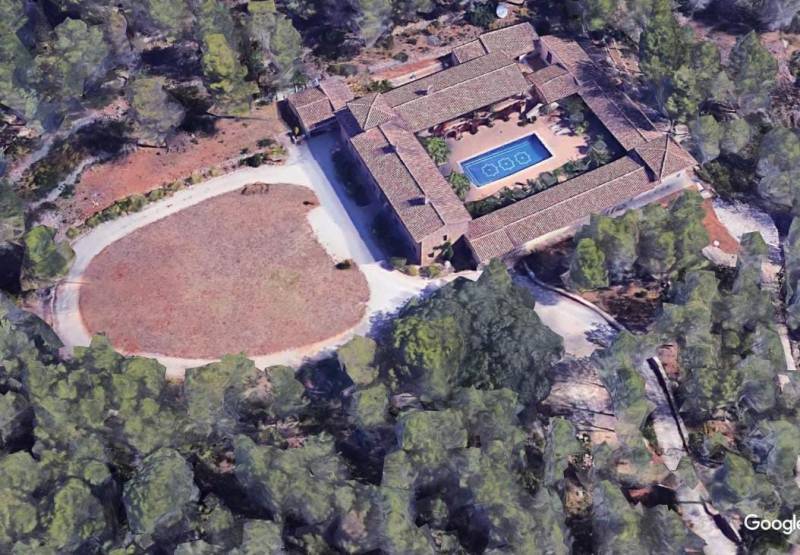- Region
- Vega baja
- Marina Alta
- Marina Baixa
- Alicante
- Baix Vinalopo
- Alto & Mitja Vinalopo
-
ALL TOWNS
- ALICANTE TOWNS
- Albatera
- Alfaz Del Pi
- Alicante City
- Alcoy
- Almoradi
- Benitatxell
- Bigastro
- Benferri
- Benidorm
- Calosa de Segura
- Calpe
- Catral
- Costa Blanca
- Cox
- Daya Vieja
- Denia
- Elche
- Elda
- Granja de Rocamora
- Guardamar del Segura
- Jacarilla
- Los Montesinos
- Orihuela
- Pedreguer
- Pilar de Horadada
- Playa Flamenca
- Quesada
- Rafal
- Redovan
- Rojales
- San Isidro
- Torrevieja
- Comunidad Valenciana
article_detail
Date Published: 25/11/2025
Justice delayed is justice denied: The legal warfare of the Llíber scandal
The story of how a large legal team managed to wangle its property developers' way out of the long arm of the law for scamming foreign homebuyers in Spain

12 "sheds" on 3,000-5,000m2 plots, in Lliber, according to their building permits
by John Michael Kirby, Technical Architect and Building Engineer (above, left)
For the 298 families betrayed in the Llíber property scandal, the recent sentencing was not an endpoint, but merely a battle won in a war of attrition that has raged for over 20 years. While the public sees a verdict, the victims have endured a masterclass in legal obstruction, where the letter of the law was weaponised not to seek truth, but to delay, obfuscate and evade accountability. The journey to this sentence reveals a justice system vulnerable to tactical warfare, where the guilty leveraged every possible loophole and the final judgment, while a landmark, feels like a compromised victory that has done little to end the suffering of the victims. All 298 homes, originally categorised as uninhabitable "sheds", continue to be completely illegal.
From the outset, the defence strategy was clear: run down the clock. The most potent weapon wielded by the defendants was the repeated invocation of the statute of limitations. Multiple defence teams, including that of Benjamin Schmidt, argued that the procedural delays between the initial investigation in 2006 and the actual trial had been so extensive that the crimes of urban planning and bribery had legally expired. This was a calculated gamble to have the most serious charges wiped away completely. The court, however, systematically dismantled this argument. It ruled that the procedural clock had been correctly interrupted by multiple investigative acts over the years, such as phone intercepts authorised in 2009 and appeals filed by the defendants themselves. Furthermore, the court established that these crimes were legally connected to the more serious charge of aggravated fraud, which carries a longer, 10-year statute of limitations. By tethering the urban planning crimes to the fraud, the court prevented the entire case from completely unravelling on a technicality, but the very attempt highlighted a system where justice can be avoided simply by outlasting it and the complete disdain that the guilty parties hold for the victims.
This was not the only legal hurdle thrown in the path of justice. The defence for the former mayor, José Mas (PP), and the architect, Amador Signes, raised the principle of non bis in idem – double jeopardy – claiming they had already been tried and acquitted for similar facts in a separate case in Benidorm in 2014. The court spent considerable effort rejecting this, determining that while the defendants were the same, the specific facts – the illegal licences for different parcels of land in Llíber – were distinct. This technical, but crucial, distinction allowed the trial to proceed, but it forced the prosecution to painstakingly re-prove a pattern of criminality that was, in essence, already widely known.
Perhaps the most telling strategy (and from a victim's perspective, a frustratingly successful one) was the systematic attempt to limit the scope of the conviction. The defence successfully argued that for the crime of fraud, the court could only consider cases where the actual victims – the defrauded homeowners – had personally testified in court about the deceit they suffered. This legal standard, while procedurally sound, had a brutal consequence: most of the transactions were excluded from the final fraud conviction because the victims, many of whom were elderly, had passed away during the two-decade wait for justice, were too ill to testify, or could no longer be located. In death and absence, their voices were silenced in the courtroom, and their specific losses were rendered invisible in the final sentencing for fraud. This is a profound injustice: the promotors profited from every single sale, but they could only be held fully accountable for those where time and fate had not erased the direct testimony. This legal manoeuvre undoubtedly lightened their sentences, rewarding them for the very delays their tactics helped to create.
This selective accountability is further evidenced in the list of those who were acquitted of certain charges. The case against Hans George Friedrich Aust for fraud was dismissed because the specific British couple he was accused of defrauding did not provide personal testimony. Benjamin Schmid, the son of mastermind Peter Schmid, was acquitted due to the court finding he was a young, psychologically subordinate figure acting under his father's domineering control, with no real knowledge or autonomy in the criminal enterprise. Several councillors, including Vicente Andrés Ivars and José Juan Reus, were acquitted of prevarication because the court found that while they voted for the illegal licences, the prosecution could not prove beyond a reasonable doubt that they possessed a conscious knowledge of their blatant illegality, as was proven with the mayor.
These acquittals, while legally reasoned, leave victims with a sense of a system that fails to see the forest for the trees, allowing key cogs in the machine to walk away unscathed. As the sentence states, it is not reasonable that hundreds of mainly British and German elderly couples suddenly and simultaneously flood this tiny village with hundreds of requests to buy and renovate non-existent "sheds" built on rustic non-developable rustic land. The sentence also states, "It was clear to all that these were elderly foreign couples looking to buy a home." That's what their contracts stated and that's what everyone saw built day after day, year after year until the population of the village more than doubled. Ask yourself, if you had been in the place of these councillors, continually approving these hundreds of shed renovation licences and seeing the construction of hundreds of houses in a tiny village, if you would have noticed? Then ask how likely is it that the acquitted councillors, including the current mayor (PP), did not?

One of the "sheds"
And so, the victims find themselves at a new beginning, not an end. The sentencing has produced little tangible justice. Their homes remain illegal, their life savings are still gone and the compensation awarded to the lucky few exists only as a figure on a page. The pursuit of this compensation now enters a new phase of legal warfare, where the convicted parties are expected to employ a fresh arsenal of delay and evasion tactics. Endless appeals can stretch the process for years more. When enforcement finally begins, the victims anticipate a chorus of claims that the millions have vanished: through declared bankruptcy, the transfer of assets to family members or complex corporate structures designed to shield wealth. The question "Where is the money?" will likely echo for another decade, unanswered.
This is only the beginning of the pursuit of justice for a small minority of the victims. For the hundreds of others whose cases were not part of this trial, the journey has not even started. Yet, there is a burgeoning hope that this verdict will serve as a catalyst. The expat victims, who now represent the majority of the population in Llíber, are no longer just pleading for justice; they are organising to seize it. The political landscape is a stark reminder that the party under whose watch this corruption flourished, the Partido Popular (PP), still runs the town hall. This is an intolerable reality for a community built on the ruins of a PP-administered fraud.
Consequently, the victims' strategy is evolving from purely legal to powerfully political. Their intention is clear: to change the regime in the next municipal elections. By mobilising their majority, they aim to lift the rug of criminality from within the very institution that enabled it. This is no longer just about reclaiming money; it is about reclaiming governance, transparency and their right to a normal life. The sentence, for all its flaws, has provided the moral and legal foundation for this political movement. It is a declaration that the community will no longer be victims, but active citizens demanding a future where the rule of law is not a loophole to be exploited, but a promise to be fulfilled. Their fight in the courts has exposed the truth; their fight at the ballot box may be what finally secures their justice.
John Kirby is a Technical Architect and Building Engineer (UPV), having won the award for outstanding academic achievement. He is the first foreigner to win that award and the only foreigner to ever be Municipal Technical Architect in Spain and a Judicial Property expert witness in Spain. He is Commisioner for Expatriates of the Valencian government and Ambassador for Spain and Gibraltar for Chartered Association of Building Engineers (UK).
staff.inc.ali
Loading
Sign up for the Spanish News Today Editors Roundup Weekly Bulletin and get an email with all the week’s news straight to your inbox
Special offer: Subscribe now for 25% off (36.95 euros for 48 Bulletins)
OR
you can sign up to our FREE weekly roundup!
Read some of our recent bulletins:
Discount Special Offer subscription:
36.95€ for 48 Editor’s Weekly News Roundup bulletins!
Please CLICK THE BUTTON to subscribe.
(List price 3 months 12 Bulletins)
Read more stories from around Spain:
Contact Murcia Today: Editorial 000 000 000 /
Office 000 000 000

























